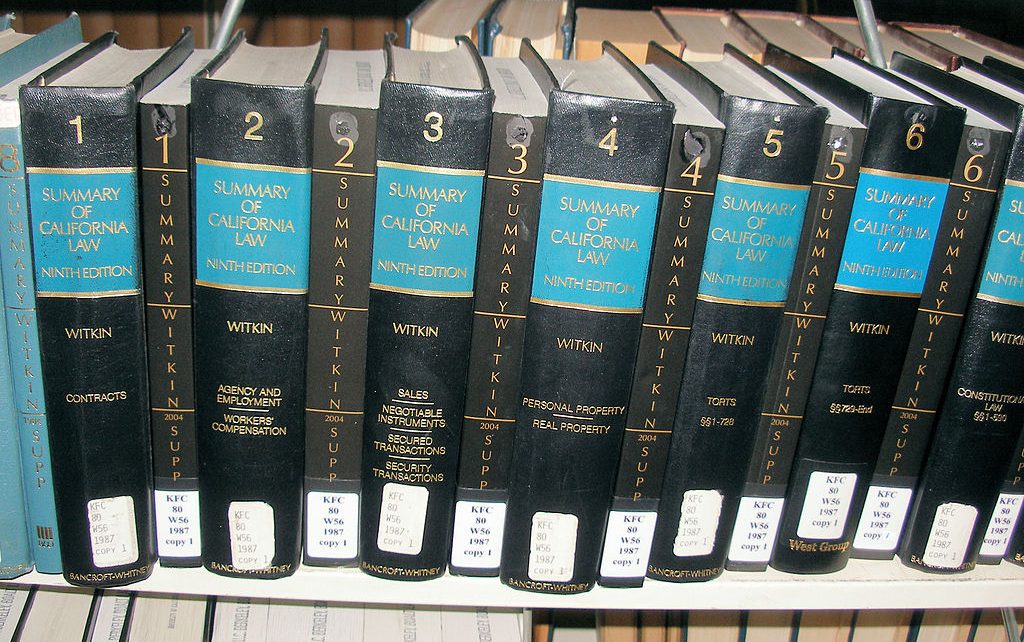
Summary of California Law books. (Photo: Wikipedia)
Severability or Savings Clauses in California Bills
Sometimes the legislature wants a statute to either stand or fall on its own
By Chris Micheli, October 18, 2020 8:12 am
On occasion, a reader may come across a severability or savings clause contained in a California bill. Basically, a severability clause is a statement by the Legislature that, if a part of a law that is enacted is subsequently held to be unconstitutional, then the unconstitutional provision(s) does not invalidate the rest of the law. It is a type of savings clause in that it “saves” parts of a law if any other parts of the law are invalidated by court action. Some states have a general severability clause applicable across all statutes.
So, the general rule developed and applied by the courts is that, if a portion of a statute is invalid or unconstitutional, then the remaining portions of the statute are valid and enforceable if they stand on their own. On the other hand, if the remaining portions are completely dependent on the stricken portions, then the remaining portions are also invalid.
Why are severability or savings clauses used? Sometimes the legislature wants a statute to either stand or fall on its own. To avoid a court interpretation that might allow a statute to continue remaining in force after a portion of the statute has been invalidated, a bill drafter may insert a non-severability clause at or near the end of the bill.
As a general rule, a bill drafter should only use a severability clause when there is a possibility of a statute being partially invalidated and it is not clear that the intention of the Legislature is that the bill be severed. However, others believe a severability clause is unnecessary for legal purposes because the courts have repeatedly ruled that, regardless of the presence or absence of a severability clause in a statute, the courts will sever invalid portions from an otherwise valid law whenever possible.
In other words, some observers argue that a severability clause ordinarily is not necessary because both statutes and common law make statutory provisions severable. Nonetheless, we find these provisions scattered throughout California laws. Even the state Constitution utilizes such a provision. For example, Article I, Section 31(h) provides, in part, that “Any provision held invalid shall be severable from the remaining portions of this section.” Similarly, Article X B, Section 16 specifies that, “and to this end, the provisions of this article are severable.”
In addition, numerous California statutes contain severability clauses. For example, Government Code Section 9906, which is entitled “Severability,” provides the following: “If any provision of this chapter, or the application of any such provision to any person or circumstances, shall be held invalid, the remainder of this chapter to the extent it can be given effect, or the application of such provision to persons or circumstances other than those as to which it is held invalid, shall not be affected thereby, and to this end the provisions of this chapter are severable.”
Additional examples of some of the standardized language found in California legislation include:
The provisions of this bill are severable. If any provision of this bill or its application is held invalid, that invalidity shall not affect other provisions or applications that can be given effect without the invalid provision or application.
If any provision of this act or the application thereof to any person or circumstance is held invalid for any reason in a court of competent jurisdiction, the invalidity shall not affect other provisions or any other application of this act which can be given effect without the invalid provision or application, and for this purpose the provisions of this act are declared severable.
Because some courts have given some weight to the inclusion of a severability clause in specific statutes, a severability clause is occasionally included in a measure, especially in long or controversial bills or when a legislator specifically requests its inclusion in a bill. But such clauses are not necessary in most legislation.
- Response to Interrogatories - February 20, 2026
- Insignia of Nonprofit Associations - February 19, 2026
- Endangered Species Regulation - February 19, 2026




